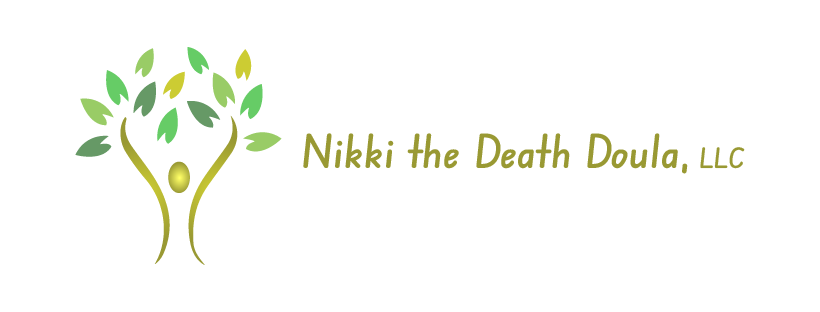Addressing Common Fears About Dying
“I’m not scared of death. I'm scared of dying.” Boy, do I hear this a LOT.
If you’ve been following me for any amount of time you’ve heard me mention that dying is one of those topics most people would rather not touch with a ten-foot pole (or even a slightly shorter pole). We avoid it, we dance around it, we whisper about it behind our hands. And yet it’s the one experience every single one of us will share. If we can talk about birth, taxes, and whatever horror is lurking in our email inboxes, we can talk about death, too.
When people do finally open up about it, the same fears seem to show up again and again. And while each fear is deeply personal, there are some universal threads that weave through our human worries. Let’s take a look at a few of the most common fears about dying, and how we might soften them.
Fear #1: The Pain
When people think about dying, their first fear is often: Will it hurt?
The truth: sometimes dying involves discomfort, but there’s a lot we can do to manage it. Modern medicine has come a long way in making end-of-life care more comfortable. Hospice and palliative care teams specialize in pain management. Not just physical pain, but also emotional, spiritual, and even relational pain.
What helps:
Asking early for palliative or hospice support. You don’t have to wait until the “last days” for comfort care. (In fact the worst choice is to wait too long!)
Remembering that “dying” is a process, not a single dramatic moment. Pain tends to ebb and flow, and there are ways to ease it.
Trusting your care team to advocate for you. You do not have to suffer in silence.
Fear #2: Losing Control/Dignity
Dying can feel like the ultimate loss of control. Bodies change, independence shifts, and even making decisions can get harder. For people who’ve lived their lives calling all the shots, this can be terrifying. (Me over here avoiding eye contact…..)
What helps:
Advance care planning. Writing down your wishes (through advance directives, living wills, and conversations with your loved ones) keeps your voice present, even when you can’t speak.
Choosing your environment. Many people don’t realize they have options: at home, in hospice centers, sometimes even in places that feel comforting and familiar.
Focusing on small choices. Even if you can’t control the big picture, little decisions, like what music plays, who visits, how your space is arranged, can matter deeply.
Fear #3: The Unknown
Even people of strong faith sometimes whisper: But what if I’m wrong? What if it’s just…nothing? That fear of the great unknown is wired into us. Our brains like certainty, and death is the biggest mystery of all.
What helps:
Naming it out loud. Fear often grows in the dark but shrinks in the light of conversation. What’s your worst fear? What is your hope?
Exploring your beliefs. Whether spiritual, religious, or philosophical, leaning into what feels true to you can provide grounding.
Letting go of needing “proof.” Sometimes peace comes not from having the answers, but from leaning into the mystery.
Fear #4: Leaving Loved Ones Behind
For many, the hardest part isn’t dying. It’s knowing we’ll leave people we love to grieve. Parents worry about children. Partners worry about spouses. Friends worry about friends.
What helps:
Honest conversations. Saying the things that need to be said (“I love you,” “I’m proud of you,” “Please delete my browser history”) can bring peace.
Legacy projects. Writing letters, recording stories, passing down recipes or traditions. These can become anchors for loved ones.
Trusting that grief, while heavy, is survivable. Humans are heartbreakingly resilient.
Fear #5: Being Alone
Dying can feel isolating. There’s a worry that no one will be there, or that others won’t understand what you’re experiencing.
What helps:
Community support. Hospice volunteers, doulas, spiritual counselors, and loved ones can sit vigil.
Ritual and presence. Sometimes it’s less about words and more about someone simply being there. Holding a hand, offering silence, bearing witness. (Hi! Death Doulas can help here!)
Reminding yourself: even if the final breaths are taken alone, you are never truly forgotten. Your life has already woven itself into countless others.
Fear #6: Dying “Badly”
We live in a culture that doesn’t show death often. When it does, it’s usually dramatic, tragic, or messy and just unrealistic. People worry about losing dignity, about not having their wishes respected, or about their death being “too much” for others to handle.
What helps:
Education. The more we understand what dying actually looks like, the less frightening it feels.
Support systems. A death doula, hospice team, or trusted advocate can help ensure things unfold as close to your wishes as possible.
Redefining dignity. Dignity isn’t about perfection; it’s about being cared for with respect and love, no matter the circumstances.
So, What Do We Do With These Fears?
The point isn’t to erase fear. Fear is so normal!! It tells us we care about our lives, our loved ones, our sense of self. The point is to acknowledge it, name it, and then find ways to soften it so it doesn’t keep us from living fully while we’re here.
Talking about death doesn’t make it come faster (I promise!!). But it does make it less terrifying. The more we can name our fears, the more we can prepare, and the more room we have for peace, connection, and yes, even moments of joy at the end.
Because here’s the truth: death isn’t just an ending. It’s also a passage. And while none of us get to skip it, we do get to choose how we walk toward it. Afraid and alone, or with courage, humor, and the love of those who walk beside us.
If your fear is getting the best of you and you just need someone to listen, please reach out.
